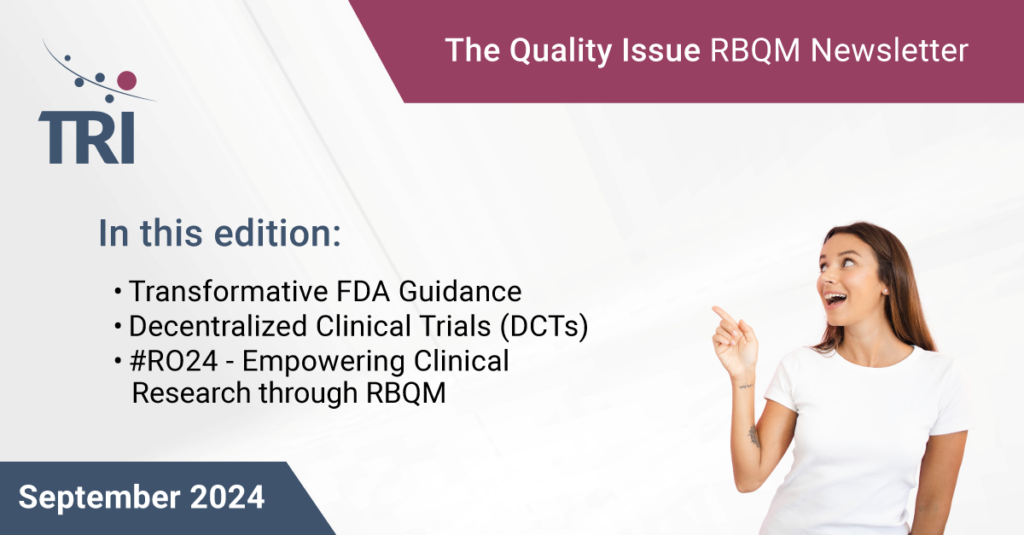The Quality Issue – September 2024

Welcome to this month’s Quality Issue, where we spotlight some of the most important developments in clinical research and Risk-Based Quality Management (RBQM). From transformative FDA guidance to our upcoming virtual event, here’s what you need to know.
FDA Draft Guidance Aims to Transform Clinical Trials by Integrating RCTs into Routine Practice
The FDA has released a draft guidance titled “Integrating Randomized Controlled Trials for Drug and Biological Products Into Routine Clinical Practice Guidance for Industry.” This draft has the potential to reshape the clinical trial landscape, merging Randomized Controlled Trials (RCTs) with routine healthcare practices. This shift could make trials less burdensome on participants, speed up recruitment, and generate data that better reflects real-world patient experiences.
The key highlights include:
- Simplification of Trial Procedures: By focusing on essential data and leveraging existing electronic health records (EHRs), the FDA hopes to make trials more efficient.
- More Inclusive Trials: Conducting RCTs in local healthcare settings could broaden participant diversity, leading to more representative trial outcomes.
- Quality by Design (QbD): The FDA is pushing for the application of QbD principles to enhance trial efficiency without sacrificing quality.
For more details, read the full article here.
FDA Finalizes Guidance on Decentralized Clinical Trials (DCTs)
The U.S. Food and Drug Administration (FDA) has finalized its Guidance for Conducting Clinical Trials with Decentralized Elements, reflecting the growing shift towards decentralized clinical trials (DCTs). Decentralized models, where activities like telehealth visits, home-based care, and local healthcare providers replace traditional trial sites, offer better accessibility but also bring new challenges in risk management and data oversight.
Key takeaways:
- Decentralization Advantages: These trials aim to improve patient inclusivity, particularly in underserved areas, and enhance trial diversity.
- Risk Management Focus: The decentralized nature of these trials introduces complexities that demand robust monitoring strategies. Risk-Based Quality Management (RBQM) systems, particularly centralized monitoring, are essential to maintain data integrity and ensure patient safety.
- FDA’s Recommendations: The FDA emphasizes centralized monitoring and digital health technologies (DHTs) to tackle the data challenges posed by DCTs.
For more details, read the full article here.
Join Us for RBQM Ops 2024 on November 7
We’re excited to invite you to RBQM Operations 2024: Empowering Clinical Research Through RBQM Innovation on November 7. This virtual event will feature some of the industry’s most prominent RBQM influencers and is designed to help clinical research Sponsors and CROs navigate the evolving RBQM landscape.
Event highlights:
- Track 1: Making the Case for RBQM
- Track 2: Real World RBQM Lessons
Whether you’re new to RBQM or a seasoned expert, this event has something for you. Don’t miss your chance to learn from the best in the field!
Register now and secure your spot for this complimentary learning opportunity!
We hope you find this edition insightful and useful as we continue to explore the latest in RBQM and clinical research. Stay tuned for more updates next month!
